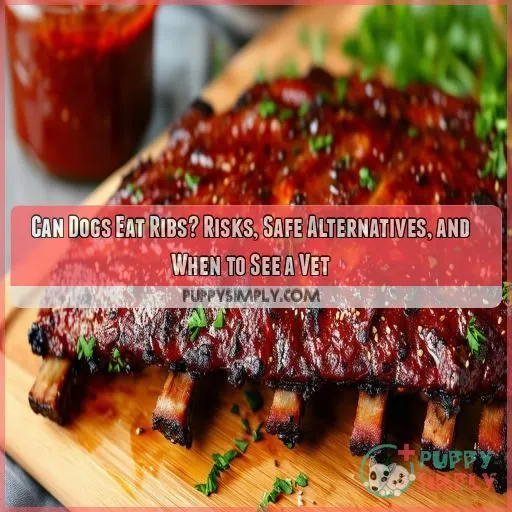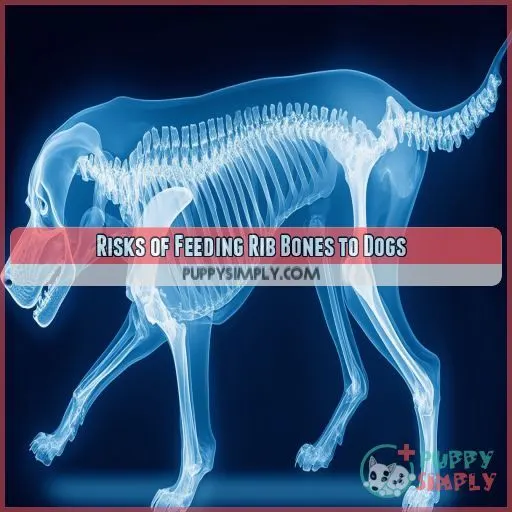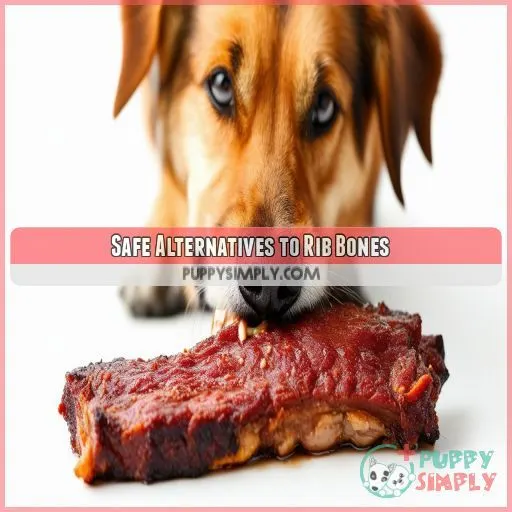This site is supported by our readers. We may earn a commission, at no cost to you, if you purchase through links.
1 You should know that 90% of dog emergency vet visits are gastrointestinal. Therefore, if you are wondering, "Can dogs eat ribs?", the answer is no.
You should know that 90% of dog emergency vet visits are gastrointestinal. Therefore, if you are wondering, "Can dogs eat ribs?", the answer is no.
Feeding your dog rib bones is a serious health hazard, which may include choking, intestinal blockages, and perforations. In this article, we will take a closer look at such perils and offer you safe alternatives while guiding on when to visit a vet.
Your pet’s health is in your hands
Table Of Contents
- Key Takeaways
- Can Dogs Eat Ribs?
- Risks of Feeding Rib Bones to Dogs
- Safe Alternatives to Rib Bones
- When to Seek Veterinary Care
- Frequently Asked Questions (FAQs)
- Can dogs eat cooked ribs?
- What bones are safe for dogs to chew on?
- What bones can I give my dog?
- Can dogs digest bones?
- Can dogs eat BBQ ribs?
- Can one eat pork ribs if they have diabetes?
- Can dogs eat rib bones?
- Can dogs eat baby back rib bones?
- Are there health benefits of rib meat for dogs?
- What should I do if my dog eats cooked ribs?
- How do I dispose of rib bones safely?
- Can rib bones be used for dental health in dogs?
- What are the symptoms of pancreatitis in dogs?
- Conclusion
Key Takeaways
- Dogs can’t handle rib bones! They’re like tiny swords that can get stuck in their throats or tummies, causing a world of hurt.
- Instead, give your furry friend safe chews like bully sticks or rubber toys. They’ll keep their teeth clean and their tummies happy.
- If your dog does get their paws on a rib bone, watch them like a hawk for signs of trouble like vomiting, choking, or bloody poop. Don’t wait – call your vet right away!
- Remember, your dog’s health is in your hands. So, keep those ribs out of reach and give them safe chews instead. You’ll both be happier for it!
Can Dogs Eat Ribs?
Rib bones should not be fed to dogs because the bones can splinter and cause choking or intestinal obstruction that may lead to death. Both raw and cooked rib bones pose all of the dangers mentioned above of gastrointestinal upset and perforations, especially if cooked.
Instead, give your pup safe alternatives like dental chews, frozen treats, or supervised chew toys.
If you notice vomiting, bloody stools, loss of appetite, or related symptoms in your dog, rush it to the vet. Be sure about the safety of your furry friend at all times. Explore more on ways to ensure it’s staying healthy and happy
Risks of Feeding Rib Bones to Dogs
Feeding rib bones to your dog comes with significant risks, including splintering, which can cause choking, and intestinal blockages or perforations. Additionally, rib bones can lead to gastrointestinal upset, making them a dangerous option for your pet
Splintering and Choking Hazards
Rib bones can splinter easily, posing severe choking hazards. Small fragments can injure your dog, leading to serious health issues. Always prioritize safer alternatives and supervised chewing to prevent accidents.
- Raw meat bones can splinter
- Cooked bones are particularly hazardous
- Bone fragments can lodge in the throat
- Choking risks are higher for small dogs
- Monitoring reduces potential danger
Intestinal Blockages and Perforations
On top of splintering, rib bones can cause blockages in your dog’s intestines, leading to serious issues:
- Bone blockages can obstruct digestion.
- Foreign body obstructions from bone fragments.
- Perforations leading to sepsis.
- Bone hazards vary for dogs of different sizes, with smaller dogs at higher risk. Always prioritize bone safety over treat temptation
Gastrointestinal Upset
Feeding your dog rib bones can lead to gastrointestinal upset. Cooked rib bones with toxic seasonings can cause digestion problems like vomiting and diarrhea. They irritate the stomach, increasing the risk of pancreatitis. Remember:
- Pancreatitis risks from fatty meat.
- Upset stomach from seasoning and bone fragments.
- Monitor your dog closely for any gastrointestinal complications.
Always prioritize your pet’s safety
Safe Alternatives to Rib Bones
Instead of rib bones, provide your dog with dental chews and treats, frozen treats, or supervised chew toys. These alternatives can improve dental health, satisfy the need to chew, and help avoid potential health risks
Dental Chews and Treats
Dental chews and treats are great bone alternatives for ensuring your dog’s dental health. They help keep teeth clean and control tartar and plaque, reducing the risk of gum disease. Plus, they freshen breath.
- Choose dental chews designed for dogs
- Look for treats approved by veterinary dentists
- Use durable chew toys that promote dental health
Frozen Treats
Frozen treats offer a fantastic alternative to rib bones, providing mental stimulation and soothing sore gums. Fill a durable rubber toy with low-sodium broth or plain yogurt, then freeze it for a long-lasting chew.
- Mental Stimulation: Keeps your dog’s mind engaged.
- Sore Gums Relief: Cold treats help alleviate discomfort.
- Safe Alternative: Safer than bones without the risks
Supervised Chewing
Always supervise your dog with chew toys. Choose the appropriate size to prevent choking. Make sure that:
- Select durable toys or treats: This reduces the risk of fragments breaking off.
- Limit the time and number of times chewing occurs: Prevent overuse and possible dental problems.
- Observe the behavior: Be sure they don’t swallow big pieces and that the teeth are properly cleaned
When to Seek Veterinary Care
It is critical to know: when to rush the animal for emergency veterinary help if the dog has ingested rib bones. Be on the lookout for, and respond promptly to any alarming symptoms present.
- Critical Symptoms: Watch for vomiting, bloody stool, or any sign of esophageal obstruction, such as an excessive amount of drooling or rubbing at their head and neck. Such signs often mean that attention is needed quite rapidly.
- Emergency Situations: Monitor irritation or stress of the bone. If a dog shows loss of appetite or is lethargic or in severe distress, it’s going to need help right away.
- Monitor and Act: Even if your dog demonstrates only mild signs such as diarrhea or mild vomiting, the best alternative is to monitor your dog. Attention from your veterinarian can help prevent serious disaster.
Always prioritize your fuzzy friend’s health, and don’t hesitate to contact your veterinarian if there are any danger signs.
Frequently Asked Questions (FAQs)
Can dogs eat cooked ribs?
No, dogs shouldn’t eat cooked ribs. Cooked bones can splinter and cause serious health issues like choking, intestinal blockages, or lacerations. Always opt for safe chewing alternatives like bully sticks or tough, rubber toys
What bones are safe for dogs to chew on?
Safe bones for dogs to chew on include bully sticks, antlers, and durable rubber toys. Avoid poultry and pork bones as they can splinter. Always supervise your dog while chewing to avoid any potential hazards
What bones can I give my dog?
It’s okay to give your dog bully sticks, antlers, and rugged rubber toys designed for chewing. Always be present when your dog is chewing on something, whether it be a bone or whatever, to prevent any disaster, and make sure that the item chosen is the right size for the pup.
Can dogs digest bones?
You might think bones are harmless for dogs, but they can cause serious harm. Dogs can’t safely digest bones; they splinter, block intestines, and lead to severe complications. Always choose safe alternatives for chewing
Can dogs eat BBQ ribs?
No, you shouldn’t let your pup chew on BBQ ribs. The bones can splinter and cause choking or internal injuries. Stick to safer chew toys and treats made just for dogs to keep them happy and healthy
Can one eat pork ribs if they have diabetes?
If you have diabetes, eating pork ribs means indulging with some caution. Choose a leaner cut and skip the sugary sauces to balance your sugar intake with vegetables. This will help you maintain blood sugar levels at the top of the checklists submitted and make sure you’re making heart-healthy food choices.
Can dogs eat rib bones?
Don’t give your dog rib bones. They can splinter and cause choking, gastrointestinal blockages, and internal injuries. Opt for safe alternatives like bully sticks or rubber toys to keep your furry friend healthy and happy
Can dogs eat baby back rib bones?
No, dogs shouldn’t eat baby back rib bones. These bones can splinter, causing choking or severe internal damage. Always opt for safer alternatives like rubber toys or bully sticks to protect your dog’s health and well-being
Are there health benefits of rib meat for dogs?
Rib meat isn’t inherently toxic for dogs, but it’s often seasoned, which can upset their stomach, and high in fat, potentially leading to pancreatitis. Instead, opt for lean, unseasoned meat in moderation
What should I do if my dog eats cooked ribs?
If your dog eats cooked ribs, immediately call your vet. Keep a hawk’s eye on them for signs like choking, vomiting, or bloody stool. Don’t procrastinate; quick action can be the difference between life and death
How do I dispose of rib bones safely?
Dispose of rib bones by wrapping them securely in a plastic bag and placing them in a sealed trash bin. This prevents your dog from scavenging and reduces the risk of harmful ingestion
Can rib bones be used for dental health in dogs?
Using rib bones for dental health is like playing with fire—don’t do it. They can splinter and cause severe injuries. Opt for safer alternatives like rubber toys or dental chews to keep your dog’s teeth healthy
What are the symptoms of pancreatitis in dogs?
The symptoms of pancreatitis in dogs include vomiting, diarrhea, lethargy, abdominal pain, loss of appetite, and dehydration. If you notice any of these signs, contact your veterinarian immediately for effective treatment and safety of your pet.
Conclusion
In a nutshell, dogs shouldn’t eat ribs under any circumstances. The risks are too high: life-threatening choking hazards, intestinal blockages, and perforations.
Instead, try safe alternatives like dental chews and frozen treats, along with supervised chewing activities. Be sure to monitor your dog’s health for signs of distress and take your dog in for veterinary care immediately if you notice these symptoms.
Your watchfulness is critical in ensuring a happy and healthy lifetime for companion animals










